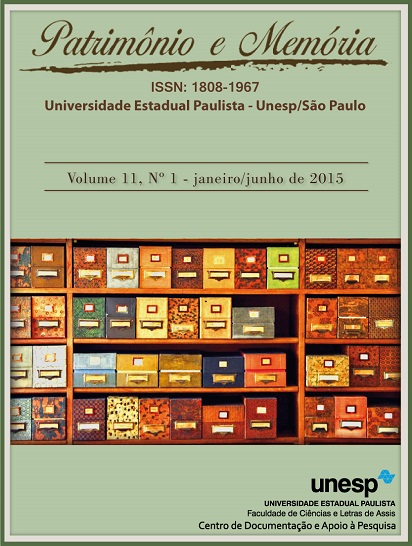Recordando a barbárie para libertar ou oprimir
usos e abusos mnemônicos do nazismo
DOI:
https://doi.org/10.5016/pem.v11i1.3514Palavras-chave:
Holocausto, Memória, Israel, Ocupação israelense, Indústria do HolocaustoResumo
O genocídio perpetrado pelo nazismo ocupa um lugar destacado na história do século XX como paradigma da barbárie. Nessa condição, tornou-se também um expediente discursivo muito utilizado para legitimar ou estigmatizar (“nazificar”) certos agentes e causas. O presente trabalho historiciza e explora representações concorrentes das atrocidades nazistas, analisando como se constitui em capital simbólico mobilizado para justificar ou condenar as ações do Estado israelense que, por sua vez, busca se afirmar como porta-voz de todas as vítimas do holocausto. O artigo apresenta os primeiros usos dessa memória e os principais críticos de sua manipulação discursiva. Na sequência o enfoque recai sobre uma dimensão pouco explorada da questão: as evocações do nazismo para condenar a ocupação e certas ações israelenses, dos anos 1940 até 2014. Ao final, esse uso específico é contraposto à bibliografia especializada sobre modernidade, holocausto e barbárie.
Referências
AGAMBEN, Giorgio. Estado de exceção. São Paulo: Boitempo, 2004.
______. Homo Sacer: o poder soberano e a vida nua. Belo Horizonte: Editora UFMG, 2007.
ALEXANDER, Edward. Antisemitism, Israeli-Style. Israel Academia-Monitor [20--]. Disponível em: <http://www.israel-academiamonitor.com/index.php?type=large_advic&advice_id=61&page_data%5Bid%5D=176&cookie_lang=en&the_session_id=01c65e18392f12ed637681a842487b7b&BLUEWEBSESSIONSID=bbeffa5415f98c9a988dca0e5d3a4189>. Acesso em: 9 dez. 2014.
AMNESTY INTERNATIONAL. Families under the Rubble. Israeli attacks on inhabited homes. London: Amnesty International Publications, 2014.
APÓS decisão sobre Hamas, Netanyahu diz que Europa “não aprendeu nada” com o Holocausto. Portal de notícias UOL, 17 dez. 2014. Disponível em: <http://noticias.uol.com.br/ultimas-noticias/afp/2014/12/17/apos-decisao-sobre-hamasnetanyahu-diz-que-europa-nao-aprendeu-nada-com-o-holocausto.htm>. Acesso em: 18 dez. 2014.
ARENDT, Hannah. Eichmann in Jerusalem. New York: The Viking Press, 1965.
______. Origens do totalitarismo. Tradução Roberto Raposo. São Paulo: Companhia das Letras, 1989.
BAUMAN, Zygmunt. Modernidade e holocausto. Rio de Janeiro: Jorge Zahar Ed., 1998.
CYTRYNOWICZ, Roney. O silêncio do sobrevivente: diálogo e rupturas entre memória e história do Holocausto. In: SELIGMANN-SILVA, Márcio (org.). História, memória, literatura. O testemunho na Era das Catástrofes. Campinas: Editora da UNICAMP, 2003, p. 125-138.
EVRON, Boas. Holocaust: the uses of disaster. Radical America, Sommerville, v. 17, n. 4, p. 7-22, jul./ago. 1983.
FEIERSTEIN, Daniel. El genocidio como práctica social. Buenos Aires: Fondo de Cultura Económica, 2011.
FINKELSTEIN, Norman. A indústria do Holocausto: reflexões sobre a exploração do sofrimento dos judeus. Rio de Janeiro: Editora Record, 2006.
FISK, Robert. Pobre Nação: as Guerras do Líbano no Século XX. Rio de Janeiro: Editora Record, 2007.
FOUCAULT, Michel. Em defesa da sociedade. São Paulo: Martins Fontes, 1999.
______. Segurança, território, população. São Paulo: Martins Fontes, 2008.
GATTAZ, André. A guerra da Palestina. São Paulo: Usina do Livro, 2003.
GELBER, Yoav. The new post-zionist historians. [S.l.:s.n.] American Jewish Committee, 2008.
INTERNATIONAL JEWISH ANTI-ZIONIST NETWORK. More than 350 Survivors and Descendants of Survivors and Victims of the Nazi Genocide Condemn Israel’s Assault on Gaza. Disponível em: <http://ijsn.net/gaza/survivors-and-descendants-letter/>. Acesso em: 25 nov. 2014.
HAJO MEYER, sobrevivente de Auschwitz: “Identifico-me sem dificuldade com a juventude palestiniana”. Primeira linha em rede, 6 ago. 2009. Disponível em: <http://primeiralinha.org/home/?p=3668>. Acesso em: 3 de out. 2011.
HOBSBAWM, Eric J. Sobre história. São Paulo: Companhia das Letras, 1998.
KASSEL, Matthew. NY TIMES Runs Ad From Holocaust Survivors Condemning Israel, Attacking Elie Wiesel. NEW YORK OBSERVER, [S.I.], 25 aug. 2014. Disponível em: <http://observer.com/2014/08/ny-times-runs-ad-from-holocaust-survivors-condemning-israelattacking-elie-wiesel/>. Acesso em: 25 nov. 2014.
LEVY, Gideon. The Holocaust and Israeli occupation cannot be compared. Haaretz, Apr. 19, 2009. Disponível em: <http://www.haaretz.com/jewish-world/2.209/gideon-levy-theholocaust-and-israeli-occupation-cannot-be-compared-1.274365>. Acesso em: 16 dez. 2014.
LÖWY, Michel. Redenção e Utopia: o judaísmo libertário na Europa Central. São Paulo: Companhia das Letras, 1989.
MEYER, Hajo Goachim. An Ethical Tradition Betrayed. The End of Judaism. Middletown: GMB, 2014.
NETANYAHU: Iran preparing for another Holocaust. Haaretz, 27 jan. 2013. Disponível em: <http://www.haaretz.com/news/diplomacy-defense/netanyahu-iran-preparing-for-anotherholocaust-1.496684>. Acesso em: 17 mar. 2104.
NEMES, Hody. Jews March in New York Rally Against Israel War in Gaza. The Jewish Daily Forward, [S.I.] 24 jul. 2014. Disponível em: <http://forward.com/articles/202796/jews-marchin-new-york-rally-against-israel-war-in/>. Acesso em: 5 dez. 2014.
ORGANIZAÇÃO PARA A UNIDADE AFRICANA. Resolution of the Council of Ministers. Addis Ababa, 1975. Disponível em: <http://www.au.int/en/sites/default/files/COUNCIL_EN_13_21_FEBRUARY_1975_COUNCIL_MINISTERS_TWENTY_FOURTH_ORDINARY_SESSION.pdf>. Acesso em: 13 mar. 2013.
PAPPÉ, Ilan. The ethnic cleansing of Palestine. Oxford: Oneworld Publications, 2008.
RABKIN, Yakov. Judeus contra judeus: a história da oposição judaica ao sionismo. São Paulo: Acatu, 2009.
SAHD, Fabio Bacila. Palestinos: as vítimas ulteriores do Holocausto. TEL: Tempo, Espaço e Linguagem, v. 2, n. 3, p. 143-171. set./ago. 2011.
______. Sionismo, modernidade e barbárie: vida e morte na Faixa de Gaza. Curitiba: Editora Graciosa, 2012.
SEGEV, Tom. The seventh million: the Israelis and the Holocaust. New York: Henry Holt Company/First Owl Books, 2000.
STERNLICHT, Alexandra. Exclusive: London Times Rejects Elie Wiesel Advertisement Condemning Hamas. NEW YORK OBSERVER, [S.I.], 5 aug. 2014. Disponível em: <http://observer.com/2014/08/exclusive-london-times-rejects-elie-weisel-advertisementcondemning-hamas/>. Acesso em: 25 nov. 2014.
ZERTAL, Idith. La nación y la muerte. La Shoá en el discurso y la política de Israel. Buenos Aires: Del Nuevo Extremo, 2010.
Downloads
Publicado
Como Citar
Edição
Seção
Licença
Copyright (c) 2015 Fabio Bacila Sahd

Este trabalho está licenciado sob uma licença Creative Commons Attribution 4.0 International License.
Todo o conteúdo do periódico, exceto onde está identificado, está licenciado sob uma Licença Creative Commons do tipo atribuição BY.


